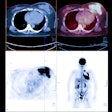President Barack Obama has debuted a new research initiative aimed at helping researchers discover new ways to treat, cure, and prevent brain disorders such as Alzheimer's disease, epilepsy, and traumatic brain injury.
Beginning in fiscal 2014, the U.S. National Institutes of Health (NIH), the Defense Advanced Research Projects Agency (DARPA), and the National Science Foundation will support approximately $100 million in research to jump-start the effort, called the Brain Research Through Advancing Innovative Neurotechnologies (BRAIN) initiative, according to the White House.
The NIH will establish a working group co-chaired by Dr. Cornelia "Cori" Bargmann of Rockefeller University and Dr. William Newsome of Stanford University to define scientific goals for the NIH's investment. There will also be a multiyear scientific plan for achieving these goals, including timetables, milestones, and cost estimates, the White House said.
As part of BRAIN, federal research agencies will partner with companies, foundations, and private research institutions that are also investing in relevant neuroscience research, such as the Allen Institute, the Howard Hughes Medical Institute, the Kavli Foundation, and the Salk Institute for Biological Studies.
To ensure that ethical standards are maintained, the White House said it would direct the Commission for the Study of Bioethical Issues to explore the ethical, legal, and societal implications raised by this research initiative and other recent advances in neuroscience.
The NIH Blueprint for Neuroscience Research initiative will allocate approximately $40 million to BRAIN in fiscal 2014, while DARPA plans to invest $50 million in a set of programs with the hope of understanding the dynamic functions of the brain and demonstrating breakthrough applications based on these insights, the White House said.
The National Science Foundation will support approximately $20 million in BRAIN research, covering areas such as the development of molecular-scale probes that can sense and record the activity of neural networks.
In private-sector partner contributions, more than $60 million each year will be spent to support projects at the Allen Institute for Brain Science related to BRAIN, while at least $30 million annually will be invested to support projects at the Howard Hughes Medical Institute (HHMI), the White House said. HHMI's Janelia Farm Research Campus in Virginia opened in 2006 with the goal of developing new imaging technologies and understanding how information is stored and processed in neural networks.
The Kavli Foundation is expected to support activities related to BRAIN with approximately $4 million per year over the next 10 years. In addition, the Salk Institute for Biological Studies will dedicate more than $28 million under its Dynamic Brain Initiative to work across traditional boundaries of neuroscience to produce a sophisticated understanding of the brain, according to the White House.




















